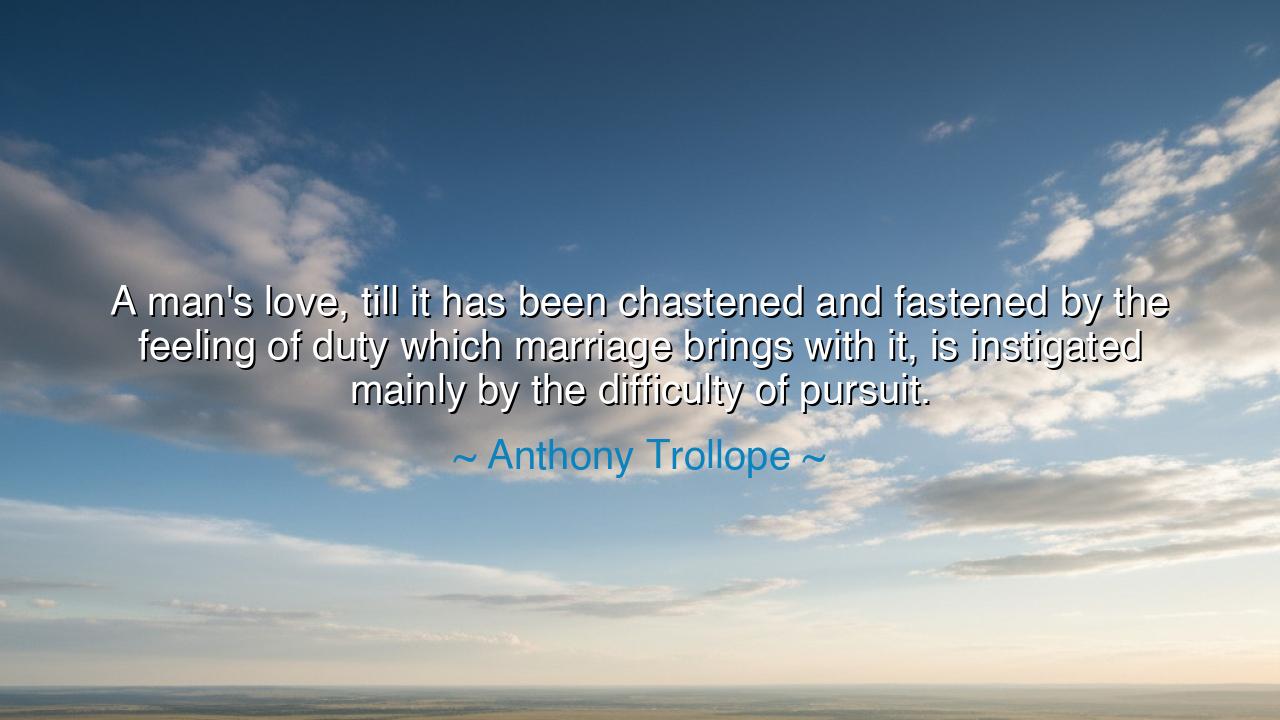
A man's love, till it has been chastened and fastened by the
A man's love, till it has been chastened and fastened by the feeling of duty which marriage brings with it, is instigated mainly by the difficulty of pursuit.






When Anthony Trollope wrote, “A man's love, till it has been chastened and fastened by the feeling of duty which marriage brings with it, is instigated mainly by the difficulty of pursuit,” he revealed one of the most profound observations about the nature of human desire and mature love. In these words lies the wisdom of one who had studied not only the hearts of men, but the discipline of duty, the transformation of passion into steadfastness. Trollope, a master of Victorian moral insight, understood that love begins in flame—but only endures when it learns the art of obedience to something higher than passion itself. His quote reminds us that true love is not proven in the chase, but in the keeping.
The meaning of this statement rests upon the distinction between infatuation and devotion. Trollope tells us that, in a man’s early passion, love is often fueled by the thrill of conquest—the pursuit, the mystery, the challenge. It is desire seeking satisfaction, not necessarily sacrifice. But once the heart is bound by the sacred duty of marriage, love must transform. No longer driven by the chase, it becomes guided by responsibility, tempered by loyalty, and anchored in honor. The man who once loved for excitement must now love for purpose. His affection must evolve from a flame that burns quickly to a lamp that burns steadily, lighting the path for years to come.
The word “chastened” is the soul of this quote. To be chastened is to be purified through discipline—to have one’s impulses refined by duty and sacrifice. In marriage, love is chastened because it is tested. It learns to withstand disappointment, to bear burdens, to forgive faults. The heart that once loved freely must now love faithfully, not because of fleeting pleasure, but because of covenant and care. Trollope teaches that passion without duty is like a river without banks—it may rush swiftly, but it floods and destroys. Duty gives love its direction, its endurance, its sanctity. Through duty, love becomes not only an emotion but a moral act.
This truth is mirrored throughout history. Consider the story of Odysseus and Penelope. When Odysseus sailed to war, his love for his wife was not sustained by pleasure or pursuit—he was gone twenty years, enduring hardship and temptation. Yet his love endured because it was bound by duty—to his home, his vow, his honor. Penelope, too, kept her love alive not through desire, but through faithful constancy, weaving and unweaving her tapestry as a symbol of devotion. Their love, chastened by time and tested by separation, became something immortal. It was no longer the excitement of the chase, but the reverence of endurance. In them, we see Trollope’s truth made flesh: love that has survived discipline is stronger than any love born of mere longing.
Trollope himself lived in an age that prized moral restraint, where duty was considered the highest expression of love. To the Victorians, marriage was not merely the union of hearts, but of virtues. They believed that affection must grow hand in hand with responsibility—that the highest form of passion was the willingness to serve. In his novels, Trollope often depicted men who mistook desire for love, only to discover that the truest affection is that which sacrifices comfort for care. His insight was not meant to diminish romance, but to elevate it—to teach that love without discipline is fleeting, while love rooted in duty is eternal.
The lesson, then, is timeless: do not trust the love that burns only in the pursuit, but the love that remains when pursuit ends. The man who truly loves is not he who desires the unattainable, but he who labors to preserve what he has vowed to cherish. Let your affection be strengthened by the weight of responsibility, and your passion be guided by purpose. For when love is bound to duty, it becomes unbreakable—no longer a storm of emotion, but a covenant of will.
So, my child, remember this wisdom of the ancients: the heart that loves only for excitement will grow restless, but the heart that loves through duty will find peace. Let love begin with beauty if it must, but let it end in faithfulness. Seek not only the fire that ignites love, but the discipline that sustains it. For in the crucible of duty, love becomes purified—no longer the desire to possess, but the willingness to protect. As Anthony Trollope reminds us, only when love is “chastened and fastened” by responsibility does it cease to be mere pursuit and rise to become what it was always meant to be—a sacred calling of the heart.






AAdministratorAdministrator
Welcome, honored guests. Please leave a comment, we will respond soon